Does your business need a Head of Growth Hacking?
Have you noticed the emergence of the term “growth hacking” for describing a marketing approach. I did and dismissed it as a fad most relevant for SaaS (Software as a Service) / single product startup businesses. But recently, I’ve noticed some new job descriptions in this area which prompted me to take another look. In particular, I noticed that The Guardian is currently advertising for a Head of Growth Hacking...
“The Guardian is committed to a “digital-first” strategy and in order to support this, we are seeking a Head of Growth Hacking to manage a virtual, cross functional team focused on GNM’s growth hacking plan. This role is responsible for finding innovative ways to accelerate adoption, use, and retention to drive up audiences to the Guardian’s digital product portfolio”.
There are other jobs available too in UK-based startups such as Gumtree, MyBuilder and VZaar and many more in the US…
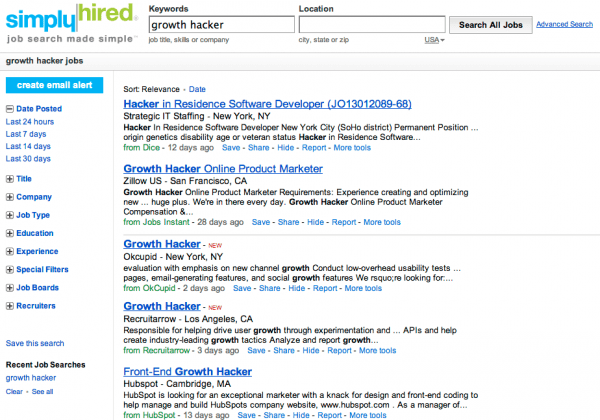
This seems to be a trend! So it prompted me to learn a bit more, and this is my take. If you’re not a fan of buzzwords which describe a concept that isn’t new, you may prefer to read: Is Growth Hacking nonsense?
What is Growth Hacking?
To answer this, it’s best to turn to Andrew Chen who brought Growth Hacking to prominence by asking “Is the Growth Hacker the new VP of Marketing”. He describes a Growth Hacker this way:
“Growth hackers are a hybrid of marketer and coder, one who looks at the traditional question of “How do I get customers for my product?” and answers with A/B tests, landing pages, viral factor, email deliverability, and Open Graph. On top of this, they layer the discipline of direct marketing, with its emphasis on quantitative measurement, scenario modeling via spreadsheets, and a lot of database queries”.
This is a great definition of Growth Hacking. In my books I define it this way, in the context of the RACE planning framework:
'A mindset which focuses marketing activities on increasing the scale and profitability of a business through testing and improving techniques for improving the value of audience touchpoints across the customer lifecycle of Reach, Interactions, Conversion and Engagement.'
I think this iceberg from Mattan Griffel is a better way of summarising some of the techniques - all should be in the digital marketers toolset already, with analytics and optimisation at the core.
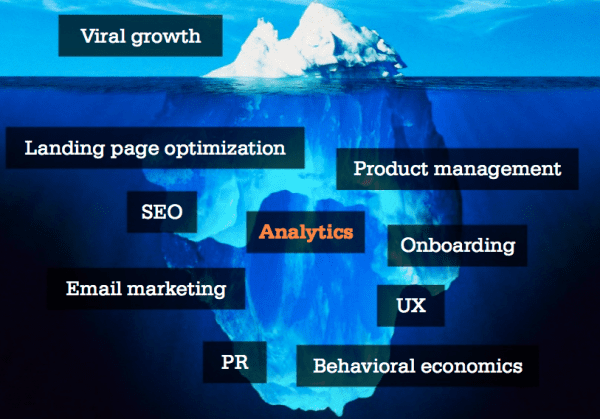
So, it’s direct marketing right? And applying digital analytics? Certainly not new… But if you’ve read the Horror Story that is the Boo.com startup failure, you will realise realism can be missing in startups, although that tale is a long time ago now.
I think the reference to a coder is misleading. This may be true in some cases, but you don’t need to be a developer to be a growth hacker, although you certainly need an agile approach to developing and implementing tests, so devs are needed there. The Guardian role is a more senior role. I do like the word “Hack” though; it’s not about hacking systems, but shows a willingness to repeatedly try new approaches to get better results.
Although the principles won't be new to marketers that doesn’t mean we can’t learn from them, it’s seems to me, that’s it’s really a mindset that many existing companies could benefit from.
What can Growth Hacking offer to existing companies?
I think Marketing Directors or Product managers won’t find much new in the focus on growth through reaching and engaging prospects and retaining them as active customers… It’s more the growth hacking approach which is novel. It is already practiced under another label of “conversion rate optimisation” by many companies I’m familiar with who are advanced in applying digital marketing, but certainly not all. The Growth hacking approach is valuable since it expands the scope beyond CRO to look at ongoing user activity and engagement.
Here's a great example from 37 Signals describing their AB Testing for the Highrise service.

What else can we learn from Growth Hackers?
- 1. Seeking sources of viral growth.
Growth hackers seek to emulate the viral growth of startups such as Facebook, Groupon and Pinterest in their early days. In fact, their poster-child, often referenced is Hotmail you will know grew rapidly due to sharing of its "PS: I love you. Get your free e-mail at Hotmail" signature.
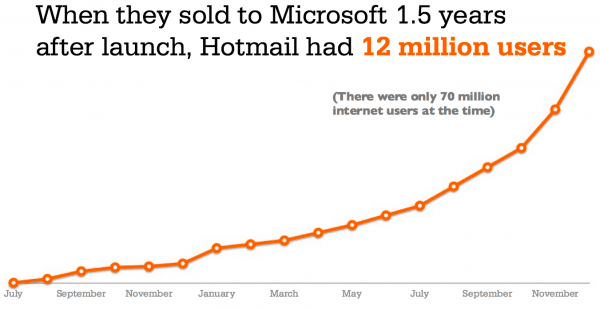
Today encouraging sharing through social sign-on and social sharing is more an approach sought by Growth Hackers. Thomas Schranz shares this example from a recent Growth Hackers conference where Elliot Shmukler’s described the lessons learned while growing LinkedIn from 13 to 175 million users.
- 2. Understanding and optimising the value of cost-effective referrers.
Not much new here, we have covered the relative value of different digital channels in our Digital Marketing: Strategy, Implementation and Practice book many years ago. Dave McClure is often referenced for his way of summarising the channel review, and rightly so. This is a great way to summarise the value of different channels to a startup or a small business.
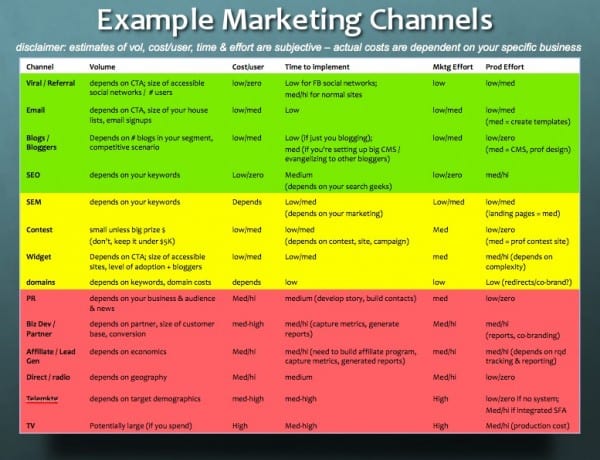
Source: Dave McClure of 500 Hats, 2008
- 3. Understanding and optimising the path to purchase in a Freemium model.
Startups, particular tech startups offering software as a service often offer a free trial or tier, so encouraging sign up to these services and conversion to a paid model. It’s at the core of their business model.
Here’s Dave McClure again, again not new, this is from 2007. It’s new to me though and has more detail than some of the RACE conversion models we use.
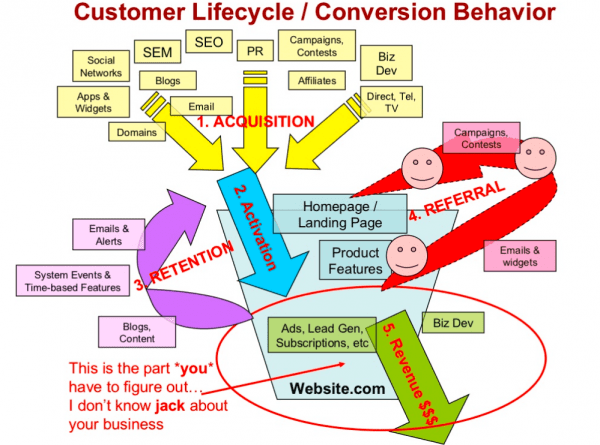
I’ll be recommending it to the students who I teach who are interested in creating a startup. It’s also relevant to the many businesses who still apply this analysis to improve what we called Epermission marketing based on Seth Godin’s lead back in 1999!
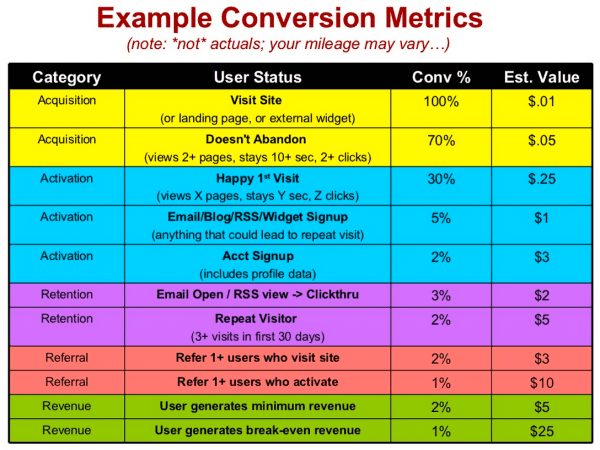
Source: Dave McClure: Metrics for Pirates, 2007
Onboarding is the process of welcoming prospects or customers and is often delivered by email, so as the example above showing understanding event-triggered emails is important. An approach that’s important so we have written a lot about in our series on Event-triggered emails.
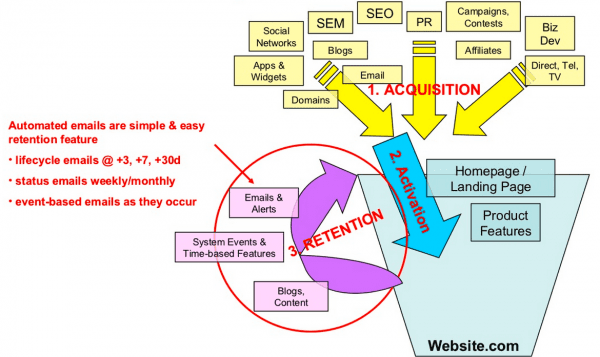
Cohort analysis in the freemium context is the process of understanding groups of customers through the conversion process. Here’s an example from Kissmetrics applied to signed-in users.
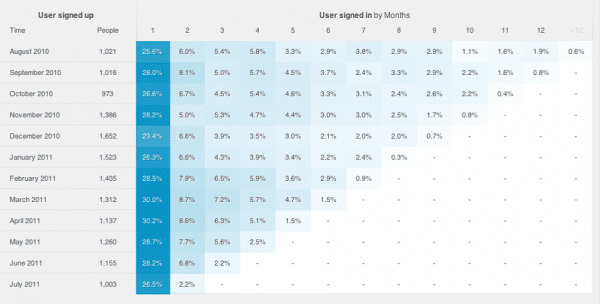
Alternatively you can review this for existing customers:
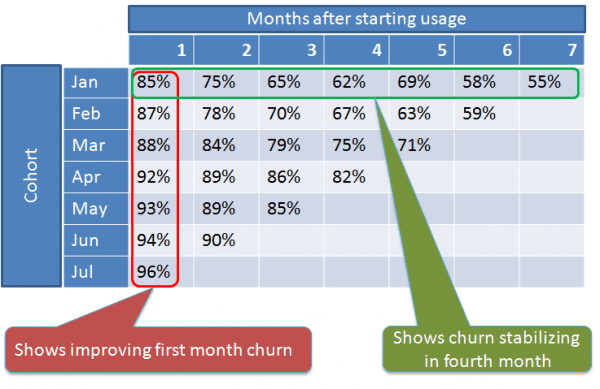
- 6. Ongoing testing and optimisation
This is has really been available since the first websites if you analysed log files. More recently I’ve seen focus on this by companies like Anazon, Dell, Expedia and Skype I’ve seen present their optimisation approaches back to founding of the Emetrics Summits and Digital Analytics Association in 2005. Even then these weren’t startups and shows that these techniques were first used in large companies who had the foresight to create teams to focus on these. Following on from this, I remember I was keynoting at Technology for Marketing in 2007 urging focus on MOA, that’s Modelling, Optimisation and Automation!
I hope this post will help some develop a more analytic, entrepreneurial approach and it’s lifted the lid on growth hacking for some. I’ve found it interesting to take a few hours comparing the Growth Hacking approach to Marketing Optimisation. If you'd like to see more examples, take a look at this slideshare from Mattan Griffel.
Download Expert Member resource – Growth Hacking Guide
This guide aims to show how growth hacking concepts can be applied to established medium and large businesses as they seek to develop more agile marketing approaches. Naturally, the checklists in this guide will also be useful for start-up and smaller businesses.
Access the Growth hacking guide


















